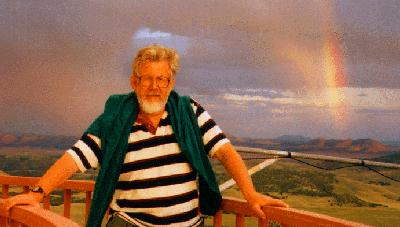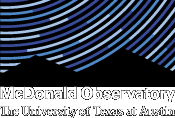Lambert
David grew up in Kent, England, just south of London. He attended an all-boys grammar school (i.e., high school). As a junior there, he won a competition for which the prize was thirty shillings toward the purchase of a book from a local shop. David went to this bookstore and, from its shelves, he pulled Frontiers of Astronomy by Fred Hoyle, a book about general astronomy. "I don't know why I chose this book; I may have just rummaged around and found it," he says. Regardless, he became enamored of the study of astronomy and, specifically, the build up of atomic elements in stars, called "nucleosynthesis."
"Not quite a proper scientist."
Upon graduating from grammar school, David enrolled in Oxford University where he completed both his undergraduate and graduate studies. While at Oxford, he was advised by a "very kind lady on the faculty" that Fred Hoyle was "not quite a proper scientist" because of his sometimes controversial ideas about astronomy. For David, however, this remark immediately drew him to Hoyle as a role model.
"I ignored that advice as I often did."
Upon graduation in 1967, David left England for America where he worked for two years at the California Institute of Technology. While he did some stellar spectroscopy at Caltech's Mt. Wilson Observatory, David's sights were set on the University of Texas where the Harlan J. Smith 2.7-meter Telescope was just being completed. "I was advised by numerous people to not come to Texas, but I ignored that advice as I often did." In 1969, David came to the University of Texas, and, except for semesters abroad in India and other nations, he has resided here since.
"Whatever takes your fancy."
David has spent many years learning the details of using the telescopes at McDonald and how to apply spectroscopy to understand the physical processes governing nucleosynthesis in stars. "Once you understand spectroscopy," he says, "you have a tool to apply to whatever takes your fancy." David has applied this tool in many realms. He has tested theories of cosmology, observed the gas between the stars, and has investigated ideas of star formation.
"A potassium atom absorbs this light and then squirts it out in some random direction"
One exciting moment in his career involved the discovery of a shell of gas and dust around the star Betelgeuse. Light from the star "goes out into the shell, a potassium atom absorbs this light and then squirts it out in some random direction. That random direction is sometimes headed towards McDonald Observatory." By pointing the telescope slightly away from the star, one can measure the amount of light from the potassium gives off, and determine the amount and nature of material in the shell of gas and dust surrounding the star.
"He looks like a Walt Disney dog."
David became the Director of McDonald Observatory on October 1, 2003. He has also played a direct role in teaching the students of UT about astronomy as a professor and former Chairperson of the Department of Astronomy. However, he still maintains time for a good game of squash. Since his youth, David has also had a passion for reading. As a teenager, he scoured the public library for books on astronomy. Today, he enjoys reading biographies and poetry. His favorite poets include some contemporary writers but also more traditional ones such as John Donne, a 17th century Anglican priest and poet. Together with his wife, Melody, David enjoys walking his dog, Fergas, who came from the animal shelter and "looks like a Walt Disney dog."
David Lambert
Isabel McCutcheon Harte Centennial Chair, Astronomy
Professor at The University of Texas at Austin
Director, McDonald Observatory
Isabel McCutcheon Harte Centennial Chair, University of Texas at Austin
D. Phil., Astrophysics, Balliol College, Oxford
B.A., Physics, University College, Oxford


